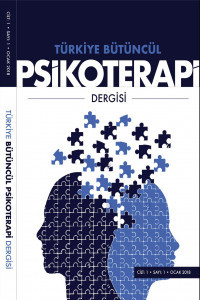Geçmişin Gölgesinde, Anne ve Bebeğin Bağlamları
Bu çalışmada bir annenin, anneliğe dair öznel ve içsel deneyimlerinin, bireysel geçmişinin izleriyle nasıl şekillendiği, annelik duyumunun biricikliği ve öznelliğinin bağlanma stillerine göre nasıl farklılaşabildiği ele alınacaktır. Bir annenin zihin yapısında yer alan ve buna bağlı olarak ortaya çıkacak olan duygu, düşünce ve davranış üçlüsündeki değişimler, bireysel tarihinde yer alan örüntülerinden, travmalardan ya da bağlanma sorunlarından bağımsız değildir. Annenin çocuğuyla olan etkileşimlerine yön veren şeyin annenin iç dünyası, yani kendi bağlanma stili öznelinde çocukluk deneyimleri ile gelişen örüntüleri olduğu yapılan çalışmalarla ortaya çıkmıştır. Anne ile bebek arasındaki ilişkinin ve çocuğun bireysel tarihinin gelişiminin de yine annenin zihninde neler olduğuna bağlı olduğunu, anne ile bebeğin etkileşimlerinin sağ beyinler üzerinden gerçekleştiğini anlıyoruz. Bu bilgiler doğrultusunda, bazı örnek vakaların öznel annelik deneyimleri Daniel Stern’in önerdiği bağlanma stilleri açısından incelenecektir.
Anahtar Kelimeler:
Annelik, Bağlanma Örüntüleri, Sağ Beyin
Contexts of Mother and Baby in the Shadow of the Past
In this study, it is discussed how a mother’s personal history shapes her subjective and inner experiences of motherhood and how uniqueness and subjectivity of the sense of motherhood changes with the effect of attachment style. Alterations in structure of a mother’s mind and the resulting changes in the triology of affect, thought and behavior are not free from individual attachment patterns, traumas and problems. It has emerged from the attachment studies that what influences mother’s interactions with the infant is the mother’s inner world, i.e. the patterns arising from childhood experiences according to her attachment style. The relationship between mother and infant and the construction of the infant’s unique history depends on the inner contents of the mother’s mind. The interactions between mother and infant take place via the right hemispheres. In line with this information, subjective motherhood experiences of some sample cases will be examined in terms of attachment styles suggested by Daniel Stern.
Keywords:
Motherhood, Attachment Styles, Right Hemisphere,
___
- Ainsworth, M. D. S., & Bell, S. M. (1970). Attachment, Exploration, and Separation: Illustrated by the Behavior of One-Year-Olds in a Strange Situation. Child Development, 41(1), 49. doi:10.2307/1127388
- Ainsworth, M. D. S. (1993). Attachments and other affectional bonds across the life cycle. In C. M. Parkes, J. Stevenson-Hinde, & P. Marris (Eds.), Attachment across the life sycle (pp. 33-51). New York: Routledge.
- Beebe, B., Jaffe, J., Markese, S., Buck, K., Chen, H., Cohen, P., … Feldstein, S. (2010). The origins of 12-month attachment: A microanalysis of 4-month mother–infant interaction. Attachment & Human Development, 12(1-2), 3–141. doi:10.1080/14616730903338985
- Bowlby, J. (2012a). Güvenli bir dayanak: Ebeveyn-çocuk Bağlanması ve Sağlıklı İnsan Gelişimi. Kocaeli: Psikoterapi Enstitüsü Yayınları.
- Bowlby, J. (2012b). Sevgi Bağlarının Kurulması ve Bozulması. Kocaeli: Psikoterapi Enstitüsü Yayınları.
- Cozolino, L. (2014). İnsan İlişkilerinin Nörobilimi: Bağlanma ve Sosyal Beynin Gelişimi. Kocaeli: Psikoterapi Enstitüsü Yayınları.
- Cozolino, L. (2017). Psikoterapinin Nörobilimi Sosyal Beyni İyileştirmek. Psikoterapi Enstitüsü Eğitim Yayınları.
- Helmeke, C., Ovtscharoff Jr, W., Poeggel, G., & Braun, K. (2001). Juvenile emotional experience alters synaptic inputs on pyramidal neurons in the anterior cingulate cortex. Cerebral Cortex, 11(8), 717-727.
- LeDoux, J. E. (2000). Emotion circuits in the brain. Annual review of neuroscience, 23(1), 155-184.
- Papoušek, M. (2007). Communication in early infancy: An arena of intersubjective learning. Infant Behavior and Development, 30(2), 258-266.
- Pipp, S., & Harmon, R. J. (1987). Attachment as regulation: A commentary. Child Development, 648-652.
- Schore, A. N. (2000). Attachment and the regulation of the right brain. Attachment & human development, 2(1), 23-47.
- Schore, A. N. (2003). Affect dysregulation and disorders of the self (Norton Series on Interpersonal Neurobiology). WW Norton & Company.
- Schore, A. N. (2012). Gelişimsel Nörobiyoloji ve Bağlanma Kuramı Atölye Çalışması Metinleri. Kocaeli: Psikoterapi Enstitüsü Yayınları.
- Schore, A. N. (2016). Affect regulation and the origin of the self: The neurobiology of emotional development. New York: Routledge.
- Siegel, D. J. (1999). The developing mind: Toward a neurobiology of interpersonal experience. Guilford Press.
- Siegel, D. J. (2021). Beynin Bilinçli Farkındalığı. Kocaeli: Psikoterapi Enstitüsü Yayınları.
- Stern, D. N. (1998). The interpersonal world of the infant: A view from psychoanalysis and developmental psychology. Londra: Karnac Books.
- Stern, D. N., Bruschweiler-Stern, N., & Freeland, A. (2013). Bir Annenin Doğuşu. İstanbul: Bilgi Üniversitesi Yayınları.
- Trevarthen, C. (1996). Lateral asymmetries in infancy: Implications for the development of the hemispheres. Neuroscience & Biobehavioral Reviews, 20(4), 571-586.
- Walker-Andrews, A. S., & Bahrick, L. E. (2001). Perceiving the real world: Infants' detection of and memory for social information. Infancy, 2(4), 469-481.
- Wilson, T. D., & Bar-Anan, Y. (2008). The unseen mind. Science, 321, 1046–1047.
- Winnicott, D. W. (1965). The maturational processes and the facilitating environment: Studies in the theory of emotional development. The International Psycho-Analytical Library, 64, 1-276.
- Wittling, W. (1997). The right hemisphere and the human stress response. Acta Physiologica Scandinavica, 161, 55-59.
- ISSN: 2587-2702
- Başlangıç: 2018
- Yayıncı: Psikoterapi Enstitüsü
